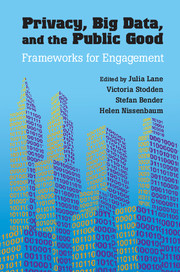Book contents
- Frontmatter
- Dedication
- Contents
- Contributors
- Editors’ Introduction
- Part I Conceptual Framework
- 1 Monitoring, Datafication, and Consent: Legal Approaches to Privacy in the Big Data Context
- 2 Big Data’s End Run around Anonymity and Consent
- 3 The Economics and Behavioral Economics of Privacy
- 4 Changing the Rules: General Principles for Data Use and Analysis
- 5 Enabling Reproducibility in Big Data Research: Balancing Confidentiality and Scientific Transparency
- Part II Practical Framework
- Part III Statistical Framework
- References
2 - Big Data’s End Run around Anonymity and Consent
Published online by Cambridge University Press: 05 July 2014
- Frontmatter
- Dedication
- Contents
- Contributors
- Editors’ Introduction
- Part I Conceptual Framework
- 1 Monitoring, Datafication, and Consent: Legal Approaches to Privacy in the Big Data Context
- 2 Big Data’s End Run around Anonymity and Consent
- 3 The Economics and Behavioral Economics of Privacy
- 4 Changing the Rules: General Principles for Data Use and Analysis
- 5 Enabling Reproducibility in Big Data Research: Balancing Confidentiality and Scientific Transparency
- Part II Practical Framework
- Part III Statistical Framework
- References
Summary
Introduction
Big data promises to deliver analytic insights that will add to the stock of scientific and social scientific knowledge, significantly improve decision making in both the public and private sector, and greatly enhance individual self-knowledge and understanding. They have already led to entirely new classes of goods and services, many of which have been embraced enthusiastically by institutions and individuals alike. And yet, where these data commit to record details about human behavior, they have been perceived as a threat to fundamental values, including everything from autonomy, to fairness, justice, due process, property, solidarity, and, perhaps most of all, privacy. Given this apparent conflict, some have taken to calling for outright prohibitions on various big data practices, while others have found good reason to finally throw caution (and privacy) to the wind in the belief that big data will more than compensate for its potential costs. Still others, of course, are searching for a principled stance on privacy that offers the flexibility necessary for these promises to be realized while respecting the important values that privacy promotes.
This is a familiar situation because it rehearses many of the long-standing tensions that have characterized each successive wave of technological innovation over the past half-century and their inevitable disruption of constraints on information flows through which privacy had been assured. It should come as no surprise that attempts to deal with new threats draw from the toolbox assembled to address earlier upheavals. Ready-to-hand, anonymity and informed consent remain the most popular tools for relieving these tensions – tensions that we accept, from the outset, as genuine and, in many cases, acute. Taking as a given that big data implicates important ethical and political values, we direct our focus instead on attempts to avoid or mitigate the conflicts that may arise. We do so because the familiar pair of anonymity and informed consent continues to strike many as the best and perhaps only way to escape the need to actually resolve these conflicts one way or the other.
Information
- Type
- Chapter
- Information
- Privacy, Big Data, and the Public GoodFrameworks for Engagement, pp. 44 - 75Publisher: Cambridge University PressPrint publication year: 2014
References
Accessibility standard: Unknown
Why this information is here
This section outlines the accessibility features of this content - including support for screen readers, full keyboard navigation and high-contrast display options. This may not be relevant for you.Accessibility Information
- 167
- Cited by
